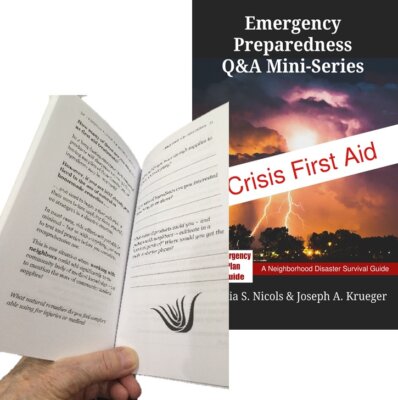Disasters are gonna happen! Planning Calendar for 2022, Part 1

We hope we never have to hear you say something like this:
“Oh, darn! I KNEW I should have fastened up that shelf / replaced those bottles of water / checked those batteries . . . !”
Truth is, disasters are gonna happen. Most aren’t entirely unexpected. And we’ve learned that if we simply prepare for a few of the biggest ones, we’ll be ready for most of the smaller ones. But if we let the small ones go . . . well, bigger and scarier emergencies are right around the corner! (Nothing worse than a spilled ice cream cone, of course!) A preparedness planning calendar can help keep us on track.
Your family’s well being comes first on your planning calendar.
About half of the Advisories we write deal with suggestions for individuals and families. They range from revisiting the contents of your go-bag, to keeping emergency radios maintained, to how solar works as an emergency power supply.
Last year, during the pandemic lock-down, we collected 14 of the most popular Advisory ideas for individuals. Then we doubled the amount of info on each basic topic. Each topic became one volume of our “Emergency Preparedness Q&A Mini-Series.”
(Happy note: one of my real estate friends gave away copies of several of the mini-books to her clients as holiday gifts. She sent me this text: “I’ve gotten many many sincere thanks for such wonderful books!!!! Thank you so much! Hugs, Jaci, Seven Gables Real Estate”)

Worried that you may have overlooked some preparedness essentials? Looking for an easy way to review? Check out our mini-series and add some of them right now to your To-do list for 2022. Pass them along when you’ve finished with them!
But don’t stop there. Take your preparing to the next step!
We think Emergency Plan Guide is unique in its focus on building prepared neighborhoods. As you have seen, in “real life” Joe and I help organize and train our own neighborhood emergency response group. We’ve done it for nearly 20 years!
So besides the info for individual preparedness, our Advisories cover activities aimed at attracting and engaging our immediate neighbors. You may recall some of our stories from 2020 and 2021. Even when so much community activity was shuttered, our team was able to put together an “Emergency Whistle Give-away,” hold a first-of-its-kind virtual meeting with our City’s Emergency Manager, and very early on, reach out to isolated neighbors via simple telephone conference calls.
Neighborhood resilience depends on — neighbors!
No matter what the make-up of your neighborhood, every family will benefit by knowing more about readiness. But we believe preparedness extends beyond each family having emergency supplies and training.
A prepared neighborhood may be able to rescue and support those people whose homes or livelihood were damaged or destroyed!
It was neighbors who pulled out boats to search for survivors in the floods after Hurricane Harvey. After Hurricane Ida slammed into Louisiana, it was neighbors who got busy and nailed blue tarps over leaking roofs when there was no sign of promised government help. When the tornados hit in Kentucky last month, it was neighbors who pulled people from the debris in the darkness.
Who would help YOU if an earthquake flattened your home? Your school? Your place of business? It would be your neighbors! The ones right there. The ones who know where you are likely to be. The neighbors who have gloves and crowbars and lights and are ready to jump into action as soon as they know they themselves are safe.
So as we take a look at planning for 2022, sure, let’s let the FEMA calendar guide us with some good themes. But at the same time, let’s add to our planning calendar some activities that build group awareness and resilience.
And next week, in Part 2, we’ll take a look at who you really want for your neighborhood team – and who you might NOT want.
So, a list of activities by month for 2022.
January – Time to get the year organized. Get your hands on or make your own monthly calendar, with plenty of place to write. For each month, fill in at least one appropriate topic. Then set up two columns, one to help individuals and families take action, and the other for groups. For example: In January, survey your group members to find out what they are worried about. Use that information to build in training over the course of the year to meet their concerns.
February – Winter awareness month, per FEMA. Focus on your location and your audience to identify winter threats. (For example, small children have different needs than the elderly when the power goes off . . .) Idea for group planning: what specialized winter equipment do you have available in the neighborhood that could be used to help more people? (snow plow, generator, home with fireplace, etc.) How would you deploy it?
March – Flood safety. Idea: test and emphasize your neighborhood emergency alert systems. Did forest fires ravage nearby areas? If so, watch out for mudslides and debris flow where they may never have occurred before.
April – Financial capability month. For most of us, having enough cash or savings to carry us through an emergency may simply not be possible. Idea: invite insurance professionals to speak to your neighborhood group. Be sure you come away knowing what is covered by homeowners or renters’ insurance, and what isn’t. Ask plenty of questions about wind and water damage.
May – Start of wildfire season. Big idea for this month: Become a FireWise USA Community! Sponsored by the National Fire Protection Association and local fire departments, the program helps individuals and communities get ready for summer and potential fire danger. One of our Emergency Plan Guide groups has held multiple very successful FireWise events.
June – Start of Hurricane Season and, traditionally, start of the hottest season of the year. In 2021 we experienced deadly heat waves in the Pacific Northwest. Hundreds died quietly at home, exercising outside at school, and working in orchards and fields. Find out what temperatures to expect in your location. How can you protect the most vulnerable? Idea: set up a system to check on and support seniors in your neighborhood.
July – Fireworks safety. Last year I studied the various fireworks ordinances in and around our town. Guess what?! Some fireworks were allowed in neighboring cities that weren’t allowed here! So, be sure you know the rules for kids and adult enthusiasts. And have your fire extinguishers handy.
August – Back to school. Parents, know your school’s emergency procedures. Teachers, know what’s expected and if you aren’t getting comprehensive training, demand it. Traditional fire drills aren’t really enough these days. Make sure your school is ready for other emergencies including intruders, earthquake, tornado, etc. Do you need emergency tools or equipment in the classroom? Emergency food supplies? Find out.
September – This is National Preparedness Month. Idea: Plan a Preparedness Expo for your neighborhood or group. Consider guest speakers, commercial vendors, games, exhibits by police and fire. Invite school or scout groups as partners. Solicit donations so visitors go away with starter items for their own emergency kits. Be sure to arrange for publicity.
October – Cybersecurity month plus the Great American Shakeout! Idea: Sponsor an educational meeting for local businesses, with a “Cyber-Security Checklist” as take-away. Idea for group: Present dramatic video of earthquake footage (available on YouTube) and discuss earthquake myths. Send people home with an Emergency Whistle to help if they are trapped after a shaker.
November – Holiday cooking safety. Idea: Invite professionals to demonstrate how different fire extinguishers work on different types of fires. Review fire extinguisher procedures and practice with real or digital equipment. Already been there and done that? Do it again for the benefit of new members of the group.
December – seems to be Protection Month! Ready.gov recommends getting your flu shot. Avoiding shopping scams and hazards. Managing holiday lights and fires. (I seem to have been right on schedule when I came up with my tips for using plugs and extension cords a week ago!)
Customize your planning calendar to fit your circumstances.
The ideas listed above are just that – ideas for you and your leadership team to discuss as you develop your planning calendar. Use or discard them or better yet, come up with variations that will work for you, specifically.
As we continue to emphasize, every community is unique. That’s why we wrote four different versions of our Neighborhood Disaster Survival Guide. There’s probably one for your type of neighborhood. Each of those guides, by the way, has pages full of ideas that could help fill in a year’s calendar of preparedness activities.
Whatever your source of ideas, this is a great time to get organized for the year. There’s no reason to get caught flat-footed when emergencies hit – and so many good reasons to be ready!
Virginia
Your Emergency Plan Guide team
P.S. Planning for 2022, Part 2, will be coming out in a week or so. Watch for it! It will have suggestions for building a workable neighborhood team and keeping it on track.
